DAVE'S DIARY - 1 APRIL 2006 - BUCK OWENS OBITUARY
BUCK OWENS RIP AT 76
BORN
ALVIS EDGAR OWENS JR - SHERMAN, TEXAS - AUGUST 12, 1929
DIED BAKERSFIELD, CALIFORNIA, MARCH 25, 2006
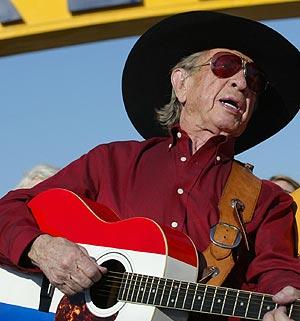 |
When
Texas born country legend Buck Owens died in the early hours of March
25 he suffered for his art. Owens, 76, died from a heart attack in his sleep shortly after his final live concert at his famed Crystal Palace in Bakersfield, California. It was the same $5 million nightclub complex he used as collateral to finance protégé Dwight Yoakam's ill-fated 2000 movie South Of Heaven, West Of Hell. And the locale where Oklahoma born superstar Garth Brooks recently proposed on stage to his fiancé - second wife Trisha Yearwood. |
It was a
tragic end to the life of the singer whose stage name Buck was taken from
a family farm mule in his Arizona childhood.
"He had come to the club early and had a chicken-fried steak dinner
and bragged that it's his favourite meal," his old friend Jim Shaw
told the Los Angeles Times.
After the
meal, he planned to cancel his Friday appearance after telling band members
he wasn't feeling well.
But before reaching his car a group of fans explained they had traveled
from Oregon to Bakersfield, 120 miles north of Los Angeles, for his show.
Owens, a Country Music Hall Of Fame inductee in 1996, returned and performed
a concert.
Shaw recalled Owens telling the audience, "'If somebody's come all
that way, I'm gonna do the show and give it my best shot. I might groan
and squeak, but I'll see what I can do."
Owens, as always, gave his body, soul and heart to his fans.
"He died in his sleep probably of heart failure," Shaw added.
"So he had his favourite meal, played a show and died in his sleep.
We thought, that's not too bad."
Owens was rushed to Bakersfield Memorial Hospital at 4:30 a.m. on Saturday
March 25 but could not be revived.
Buck had performed nearly every weekend at the Crystal Palace since opening
the complex in October 1996.
That was despite being hospitalised with throat cancer in 1993, pneumonia
in 1997 and a minor stroke in 2004.
Owens was equally stricken with love - his three marriages ended in divorce
but his new partner Karen stood by him until the end.
Three sons also survived Buck: Buddy Alan (who charted several hits as
a Capitol recording artist in the early '70s), Michael and Johnny.
Public viewing was at the Crystal Palace in Bakersfield and the funeral
was at 2 p.m. Sunday April 2 at Valley Baptist Church in Bakersfield.
FAMOUS LAST WORDS
| Owens
talked frankly about death in a recent interview with cable TV network
Great American Country. The interview was run after the star's death last week as Buck Owens: The Final Conversation. "I've tried to do a lot of good things for lot of good people," Owens said. "No, I'm not afraid to die. Let me rephrase that. I'm afraid of dying, because I won't get to be here anymore. |
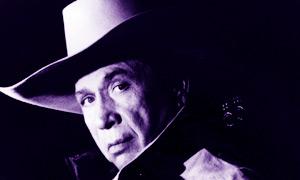 |
"But
I'm not afraid of dying, you know, to be judged. Because I've tried to
do a lot of good things for a lot of good people, and if that counts for
anything then maybe it will count enough that he won't kick me off into
the lake of fire. Maybe he'll just fly me around in orbit a thousand times."
Ironically, the special is hot on the heels of rival pay TV channel CMT
docco on the singing Texan crime novelist Kinky Friedman's campaign to
be Governor of Buck's home state Texas.
Owens made headlines in 1978 when he injuncted The Kinkster and prevented
him naming his third album Asshole From El Paso.
Friedman was forced to drop the song - the planned title track - and rename
his album Lasso From El Paso.
The song was a parody of the famous Merle Haggard song Okie From Muscogee
and Buck owned Merle's publishing at the time.
CLICK HERE for the saga of the Kinky-Buck-Merle
triangle furore in the Diary.
RAGS TO RICHES
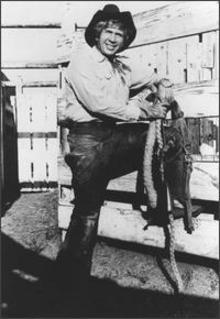 |
Buck
was the classic rags to riches story - he rose from abject poverty
to success by bucking the music industry. Owens created an alternative, vibrant twanging Californian country music to the bland Nashville sound of the sixties. Buck had more than 90 country and pop hits and built a major empire that expanded his talent for singing and acting to operating radio stations, newspapers and recording studios. He also owned a Bakersfield TV channel, radio stations in Bakersfield and Phoenix, recording and production studios and commercial property in his adoptive hometown with an estimated worth of $100 million plus. |
In 1967,
Owens launched his own music publishing company, Blue Book Publishing.
He sold the company to Tree Music Publishing in the 1980s, and his catalogue
is now a part of the giant Sony/ATV firm.
Clear Channel
bought his KNIX-FM, Phoenix, for $84 million in 1999 and his jointly owned
KESZ, also in Phoenix, for $58 million.
Owens sold more than 20 million albums and hosted cornball Nashville TV
show Hee Haw from 1969-1986 with the late Roy Clark.
The singer's longevity included a career rebirth with Tex Mex legend Flaco
Jimenez and Dwight Yoakam on their 1988 hit Streets of Bakersfield.
Owens returned to embryonic label Capitol and released two more solo albums.
That union resulted in two albums - Hot Dog in 1988 and Act
Naturally in 1989 - and five charted singles, none of which reached
the Top 20.
Buck's Act Naturally duet with Ringo Starr reached #27 in 1989.
And his last visit to Billboard charts was also in 1989 with remake of
1965 hit, Gonna Have Love.
TEXAS AND ARIZONA ROOTS
Owens, one
of 10 children, was born in the Red River Valley near Sherman, Texas,
in 1929.
And his share cropping family moved west in the early 1930s as part of
the great Dust Bowl migration, settling in Mesa, Arizona.
The Owens lived in dire poverty and moved constantly in search of work
in the fields.
They would have gone further west, but a trailer hitch broke on their
1933 Ford.
A ninth-grade dropout at 13, Owens worked in the paddocks by day and bars
at night. He hauled produce and harvested crops, and by 16 he was playing
music in taverns, after learning mandolin, guitar, trumpet, saxophone,
piano and drums.
His father gave him a cheap-but-priceless guitar, his mother showed him
a couple of chords and country music soon filled the waking moments that
weren't taken up with jobs as a messenger boy, a car-washer or a loader
of fruit.
He despised the poverty that cloaked his family, and saw music as a potential
means of escape.
"I remember always saying to myself that when I get big, I'm not
going to go to bed hungry, I'm not going to wear hand-me-down clothes,"
Owens told Rich Kienzle in an interview for the liner notes of Rhino Records'
boxed set The Buck Owens Collection
(1959-1990).
RADIO ENTREE
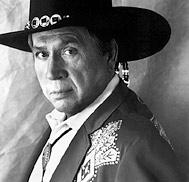 |
Mesa
radio station KTYL offered Owens, just 16, and friend Theryl Ray Britten
an unpaid, 15-minute slot, providing an entry into show business that
bloomed in the bars. Parents Alvis and Maicie Owens weren't initially supportive of the show, or of the honky-tonk barroom gigs that soon followed. But Owens determined that he could make more and easier money as a musician than as a cotton-picker and the family moved briefly to Phoenix. |
At 17 Buck
married aspiring singer Bonnie Campbell who was four months pregnant with
their first son.
In 1951, the new family moved to Bakersfield, an oil industry and farming
town north of Los Angeles.
He hoped to find work in the thriving juke joints of the famed truck-stop
town on Highway 99.
Owens joined Bill Woods & The Orange Blossom Playboys, a group that
billed itself as Central California's Top Dance Band.
He then formed his first band, the Schoolhouse Playboys.
He played saxophone and trumpet as the Playboys held court for oil-field
rowdies and Okie migrants at the Blackboard Lounge in Bakersfield.
The posted house rule: "Don't Stop Playing When a Fight Breaks Out."
While in Bakersfield in 1951, Owens picked up a used Fender Telecaster
for $35, a guitar created three years earlier by Leo Fender.
Owens' Telecaster became a trailblazer.
CAPITOL YEARS
Bakersfield
musician and songwriter Tommy Collins hired Owens to play guitar with
him on record and on a 1954 edition of The Grand Ole Opry.
Buck landed other session work at Los Angeles-based Capitol Records and
played on sessions for artists as diverse as Gene Vincent, Tommy Sands
and Stan Freberg.
He recorded for small record companies, including some rockabilly songs
done under the pseudonym Corky Jones.
His first country session was 1957 but it produced no hits so he began
his other career as a broadcaster.
Owens moved to the Tacoma, Washington suburb of Puyallup and bought into
a radio station, where he worked as a DJ and ad salesman as well as playing
gigs in the area.
He also had a live TV show in Tacoma.
Owens returned to Bakersfield and signed to Capitol in 1957 and first
hit in 1959 with Second Fiddle that peaked at #24.
It preceded his first #10 Under Your Spell Again in 1960 and his
1963 debut #1 hit Act Naturally - penned by the late Johnny Russell.
Owens had his biggest success at Capitol under the producer Ken Nelson
- a Chicago native.
Early Capitol hits included I've Got a Tiger by the Tail, Mental Cruelty
and Excuse Me
(I Think I've Got a Heartache), popularised in 1992 by the Mavericks.
Owens had 19 consecutive #1 hits from 1963-1967.
ROY NICHOLS
| After
hearing Owens' raw, earthy sound, Merle Haggard's lead guitarist Roy
Nichols also bought a Telecaster. In 1968, Owens shocked country music again by deploying late guitarist's Don Rich's fuzz tone rock guitar on Who's Gonna Mow Your Grass. Owens always bucked the system. |
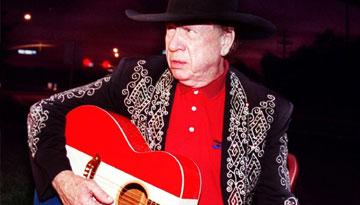 |
He and other
Bakersfield legends, Haggard, Red Simpson and Wynn Stewart created an
expressive style by experimenting with jazz, western swing and rhythm-and-blues
outside Nashville's commercial constraints.
"Being from Texas and by being part of The Grapes of Wrath migration
to California, I was accustomed to dance," Owens revealed in 1988.
"I was very influenced by Bob Wills and Spade Cooley in the early
days because people wanted to dance. I remember getting letters from people
who said since I put a little tom-tom steady drum rhythm on my records
they weren't going to buy them anymore. But I felt that's what I needed
for my songs."
Owens never performed without drums.
Even when he debuted on the drum-free Grand Ole Opry in 1960, he was able
to negotiate a snare drum with brushes - but without a microphone.
BUCK, BONNIE AND MERLE TRIANGLE
Buck was
wed to Bonnie Owens 1948 to 1953.
She sometimes performed with him and eventually went solo.
She had six charting songs, including a duet with second husband Merle.
One of her and Mr. Owens' two sons, Buddy Alan, became a singer and scored
a Top 10 hit in 1968 with Let the World Keep on A Turnin'.
Buddy Alan recorded duets with his dad as well as with Don Rich, the late
Buckaroos member who was like a brother to Buck.
Owens and long time sparring partner Merle shared more than former singing
spouse Bonnie who performed in The Hag's band before and after touring
Australia in 1996 with his fifth wife Theresa.
Bonnie became the singing spouse of Haggard in 1965.
They divorced in 1978 but Bonnie remained a backing vocalist in Haggard's
band.
"Buck and I are from the same town," Haggard revealed after
Owens death.
"We've been in many battles together, always on the same side. When
I played bass for Buck we didn't have a band name and Buck asked us what
we should call ourselves. I shouted out, The Buckaroos! - and that's the
name that stuck. Over the last few years, we became closer than we ever
realised. He even flew out to Portland to see me with Dylan. We were outlaws
together."
BUCK AUSTRALIAN TOUR
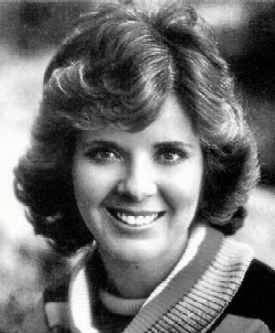 |
Owens
and his Buckaroos beat Haggard to Australia by 22 years. The singer played to packed houses in Melbourne, Sydney and Tamworth on a 1974 tour that featured Susan Raye and Tony Booth. Raye had a big international hit with L.A International Airport in 1971. Ms Raye, born in Eugene, Oregon, in 1944 was a regular artist on Hee Haw and part of the Owens travelling show. She had a brace of hit singles in the late sixties and early seventies and recorded duets with Buck on his then label Capitol. < Susan Raye |
Raye married Buckaroo drummer Jerry Wiggins in October 1971 and they now have six children.
She recorded
25 albums, including five duet albums with Owens, and earned two gold
records.
Her other big hits included Pitty, Pitty, Patter (1971), My
Heart Has A Mind Of Its Own, Wheel Of Fortune, Love Sure Feels
Good In My Heart (1972), Cheating Game (1973), Stop The
World And Let Me Off and Whatcha Gonna Do With A Dog Like That
(1974).
She later recorded for United Artists and scored a 1984 hit with Put
Another Notch In Your Belt on a Texas indie label.
Raye appeared in the 1969 movie From Nashville With Music and returned
to college at the age of 40 and is now a marriage, family and child counsellor.
Booth, born in Tampa, Florida and a member of the Buckaroos, was best
known for his tearjerker Keys In The Mail Box and Lonesome 7-7203
(1972).
Nu Country DJ and archivist Barbara Dowling met Owens when she attended
his gigs at Festival Hall in Melbourne, Tamworth and Sydney Opera House
where he recorded a live album.
"Buck was a dynamic performer and helped so many other artists who
worked outside the Nashville mainstream," Dowling revealed after
learning of his death when a guest at a recent concert at Ringwood RSL.
"He was a true legend and prolific performer and created an empire
that helped so many peers and protégées. I was lucky enough
to catch his ex-wife Bonnie Owens sing with him and Merle. He will be
missed here for influencing so many of our artists as well."
JOHNNY RUSSELL
The Beatles
performed Buck's first #1 hit Act Naturally from 1963 on Ed Sullivan's
TV variety show in 1965.
Ringo Starr sang lead vocals on their version - the flip side of Yesterday.
Starr later teamed with Owens in 1989 to cut yet another version of the
song credited to Johnny Russell and Voni Morrison.
Act Naturally was one of Owens' few hits he didn't have a hand
in writing, and at least two of his songs became major hits for other
artists.
"The Beatles were big fans of Buck's, and that's how they came to
record the song," Russell revealed before he died in 2001.
"I never thought that it would be recorded by the Beatles, but I'm
not complaining."
CLICK HERE for a Johnny Russell interview
in the Diary about the writing of Act Naturally and its success.
Ray Charles scored a #6 pop hit in 1966 with Buck tune Crying Time.
Charles' version of the song resulted in two Grammys - for best R&B
recording and best R&B solo vocal performance by a male.
Emmylou Harris broke into the country Top 10 with her cut of the Louvin
Brothers' If I Could Only Win Your Love but enjoyed her first #1
with her 1976 recording of Buck's song Together Again.
THE #1 HITS
Owens wrote
or co-wrote 15 of the 21 singles he took to the top of the country chart.
Exceptions were Act Naturally, Think of Me, Made in Japan, Streets
of Bakersfield, Johnny B. Goode and the signature instrumental, Buckaroo.
The chart toppers were
Act Naturally
- 1963 (four weeks)
Love's Gonna Live Here - 1963 (16 weeks)
My Heart Skips a Beat - 1964 (seven weeks)
Together Again - 1964 (two weeks)
I Don't Care (Just as Long as You Love Me) - 1964 (six weeks)
I've Got a Tiger by the Tail - 1965 (five weeks)
Before You Go - 1965 (six weeks)
Only You (Can Break My Heart) - 1965
Buckaroo - 1965 (two weeks)
Waitin' in Your Welfare Line - 1966 (seven weeks)
Think of Me - 1966 (six weeks)
Open Up Your Heart - 1966 (four weeks)
Where Does the Good Times Go - 1967 (four weeks)
Sam's Place - 1967 (three weeks)
Your Tender Loving Care - 1967
How Long Will My Baby Be Gone - 1968
Who's Gonna Mow Your Grass - 1969 (two weeks)
Johnny B. Goode - 1969 (two weeks)
Tall Dark Stranger - 1969
Made in Japan - 1972
Streets of Bakersfield - 1988
TV AND MOVIES
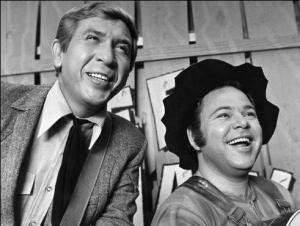 |
Owens
believed his music image suffered he was so closely associated with
the cornball TV show Hee Haw co-hosted with Roy Clark between
1969 and 1986. Buck knew it hurt his career as it typecast him as a hillbilly clown. But the money was worth it. He taped a year's worth of shows in two one-week stints, and being paid $200,000 at the end of each stint. |
"They were paying me around $400,000 a year, but I wondered about the emotional side of that product," Owens confessed.
"People
see you every week. You become a household name. I started to see my record
sales suffer. Would I do it again? ... Possibly."
But it wasn't his first TV show - in 1966 he launched Buck Owens' Ranch,
a show syndicated to 100 markets nationwide.
Fort Worth's Bill Mack, writer of the Leann Rimes smash debut hit Blue,
was the show's MC for two years.
Mack, who was "the Midnight Cowboy" on Arlington's WBAP-AM for
more than 30 years, is now heard daily on XM Satellite Radio.
"He was a funny guy; he was a good guy," says Mack. "It
took a while to get him in the hall of fame in Nashville, but he deserved
every award he ever received."
DWIGHT YOAKAM
| Kentucky
born' long time California star Yoakam convinced Owens that he was
still a beloved and vital artist in 1987. The duo toured together and released a 1988 #1 single Streets of Bakersfield. It was Buck's first for 16 years and they remained friends throughout Owens' life. It was Owens' last big hit, but he remained involved in country music with live shows at the Crystal Palace. |
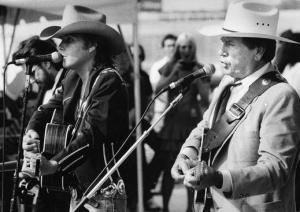 |
He also nurtured
the careers of numerous younger artists such as Brad Paisley, Kenny Chesney,
Gary Allan, Lee Ann Womack and Yoakam.
"I was devastated by Buck's passing since I had talked to him just
a couple days ago."
Yoakam said in a statement.
"And
even though he seemed in a somewhat fragile physical state, he was emotionally
exuberant and still living life in a forward motion, discussing a variety
of plans for his future.
My thoughts and prayers are with his three sons, Buddy Allen, Michael
and Johnny, his grandchildren and his girlfriend Karen. I will cherish,
forever, the musical moments he graciously shared with me during his life.
I will be eternally grateful for his fatherly chastisements, encouragement
and, ultimately, his friendship and love. I will miss him deeply."
HOT DOG - COLD MOVIE
The chart
topper with Yoakam led to Owens re-signing to Capitol Records in 1988.
That union resulted in two albums - Hot Dog in 1988 and Act
Naturally in 1989 - and five charted singles, none of which reached
the Top 20.
But his Act Naturally duet with Ringo Starr reached #27 in 1989.
Starr also sang the lead vocal on the Beatles' 1965 cover version of Owens'
hit.
It was accompanied by an Old West music video in which Owens' manager,
Jack McFadden, played the sheriff and actor Vic Tayback the bartender.
Owens bankrolled protégé Yoakam's 2000 movie South of
Heaven, West of Hell.
Dwight directed the western, set in Tucson in the early 1900s, that featured
him in a lead role with former lover Bridget Fonda, her father Peter,
Vince Vaughn, Billy Bob Thornton and Paul Reubens, better known as the
infamous Pee Wee Herman.
Among other music legends making cameos in Yoakam's ill-fated movie were
late Warren Zevon - one time Dwight duet partner - and Texan Joe Ely.
Zevon and Owens will have a few posthumous laughs in honky tonk heaven
about being involved in Yoakam's big bucks burning movie.
STARS SHINE AT FUNERAL
More than
2,000 family, friends, peers and fans turned Owens funeral at Bakersfield
Valley Baptist Church on Sunday April 2 into a joyous concert farewell.
The altar was covered with floral arrangements - recreating his trademark
red, white and blue guitar - but also featured a western hat with Together
Again scrawled on a white brim.
The event's music included the title track of Owens' gospel album,
Dust on Mother's Bible, in which a departing parent promises, "Son,
I'll meet you on the other side."
The speakers noted that Owens is reunited in the afterlife with family,
with God and with some of his former bandmates.
"He's probably with his best friend, guitarist Don Rich, up there
right now and they're pickin' and grinnin' - all of them together again,"
son Michael Owens suggested at the one hour 40 minutes service.
Garth Brooks
had a front-row seat.
Ex-Byrd Chris Hillman and Herb Pedersen, both former members of the Desert
Rose Band, performed Turn, Turn, Turn.
John Berry offered a graceful a cappella take on Blessed Assurance.
Brad Paisley, who wore a chain with a symbolic cross over a black shirt,
delivered a tender version of his gospel-themed When I Get Where I'm
Going.
The latter song - in which a singer, contemplating his death, tells friends
"Don't cry for me down here" - reflected the mood of the remembrance,
which produced more laughter than tears.
"There's never been a better friend to young artists in country music
than Buck Owens," Paisley said.
"There's never been a better businessman in the history of country
music."
Paisley told the crowd how Owens often encouraged young artists to keep
their costs down, counselling them not to tour with more than one bus
- to avoid unnecessary fuel expenses.
Brad confessed, when he expanded to multiple buses, he would park all
but one bus several miles away when he played Owens' Crystal Palace to
hide the expense from his mentor.
"It's amazing," Paisley deadpanned, "how we'd fit 40 people
on that one bus."
Paisley added that travelling from Memphis, where he performed the previous
night, provided a similar dilemma.
Only one commercial flight to Bakersfield was available for Sunday morning,
and it was inconvenient.
"I could've chartered a private jet," Paisley reasoned, "but
Buck would be sitting up in his casket right now, and there would have
been two funerals today."
"In that spirit," Paisley continued after the laughter subsided,
"Buck would be proud to know that I had a free ticket on Southwest,
and I used it today."
SPREADING THE BUCKS
Owens became
one of the wealthiest men in Bakersfield by being wise about his spending,
but he remained generous with money for the right causes.
Pastor Roger Spradlin, who conducted the service, recalled Owens donated
an expensive, new van to the church when his mother suggested it.
Son Buddy Owens (who used the name Buddy Alan as a recording artist in
the late-1960s and '70s) also said his father supported the local Society
for the Prevention of Cruelty to Animals, to whom fans were asked to send
donations in lieu of flowers.
The career advice Owens gave to younger artists was often followed.
Brooks negotiated ownership of his masters away from Capitol Records after
Owens suggested the move.
Trace Adkins remembered Owens evaluated his career with extraordinary
bluntness.
"He was so candid and frank," Adkins noted before the funeral.
"He said, 'That low note that you can hit, you need to do that in
every song, 'cause that's really all you got goin' for you.'"
Adkins apparently took that to heart.
At Sunday's service, he infused a performance of the haunting gospel piece
Wayfaring Stranger with several basement tones, including one on the song's
very last word.
Dwight Yoakam, who joined Owens on the 1988 duet Streets of Bakersfield,
said the late legend "chastised me a lot" for career missteps.
The balding Yoakam comically captured Owens' voice in recreating one specific
conversation: "Dwight, you know, you look good in that hat. You know,
I wouldn't take it off as much as you're doin'!"
Yoakam asked to be forgiven for wearing a hat in a house of worship, then
donned a tan one before singing a lonesome version of In the Garden.
Dwight is a direct musical descendent of Owens, who injected an energetic
drive into country music during the 1960s. At the time, the Nashville
Sound was in vogue, flavouring country radio with string sections and
pop-flavoured ballads.
Owens' rollicking numbers such as My Heart Skips a Beat, I've Got a
Tiger by the
Tail and Above and Beyond captured the spirit of the Bakersfield
honky-tonks in which he honed his sound that was flavoured with a little
of rock music's rebellion.
"He really liked the Beatles," Buddy Owens noted. "You
know, I think a lot of it was the fact that a lot of it was a little raw
and a little raunchy."
PATERNAL PROWESS
But music
wasn't the only thing in Owens' life. He was spiritually motivated, a
friend to his community and an inspiration as a parent.
Michael Owens called him "a wonderful, sometimes tough, father,"
relating that during his own teen years, he once borrowed Buck's brand
new Corvette while the senior Owens was on tour and received a speeding
ticket with multiple violations.
In court, Michael pleaded his case while his father sat at his side.
"I thought I'd smooth-talked this judge into just givin' me a warning
and giving me a very, very small fine," Michael remembered.
"Just as the judge was about to render his decision, Dad stood up
and said, 'Your honour, I don't think this penalty is harsh enough.'"
In short order, the teen received a heavy fine, had his license suspended
and, as a result, lost his job and had to change high schools.
Owens, who faced hardship as a youth during the Great Depression, made
sure his children learned firsthand about responsibility and about consequences.
If that experience put some distance between father and son at the time,
it was clearly not a lasting circumstance.
"I used to look forward every Sunday night to my weekly phone call
with Dad," said Michael, who managed Phoenix radio station KNIX before
the family-owned Owens Broadcasting sold it, along with another station,
in 1999 for $142 million.
"The conversation would sometimes last five minutes, and sometimes
over an hour.
Well, today is Sunday, and I'll miss his phone call. I'll be talkin' to
you today, Dad, it just won't be on the phone."
ALTRUISM
Owens was
famed on television during the 1970s and early-'80s through Hee Haw.
Series producer Sam Lovullo attended the funeral, which closed with a
big-voiced rendition of Amazing Grace by cast member Lulu Roman.
She recalled that when she first met Owens in Dallas, she was a drug-addled
orphan. He saw her as a comedic star and brought her into the Hee Haw
cast, influencing her to shed her chemical habit and become an ordained
minister.
"I would not be who I am today without Buck Owens," Roman told
the house.
After her performance, she rested her right hand on the podium and looked
down at the open casket.
"I love you," she told her friend, "and I will see you
again. And, oh my, we will sing together."
Together again.